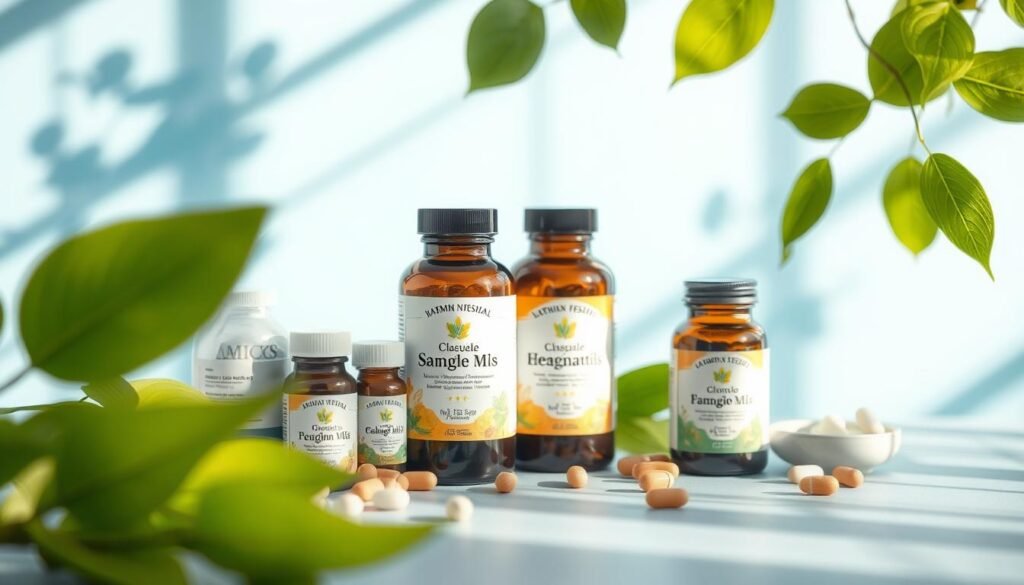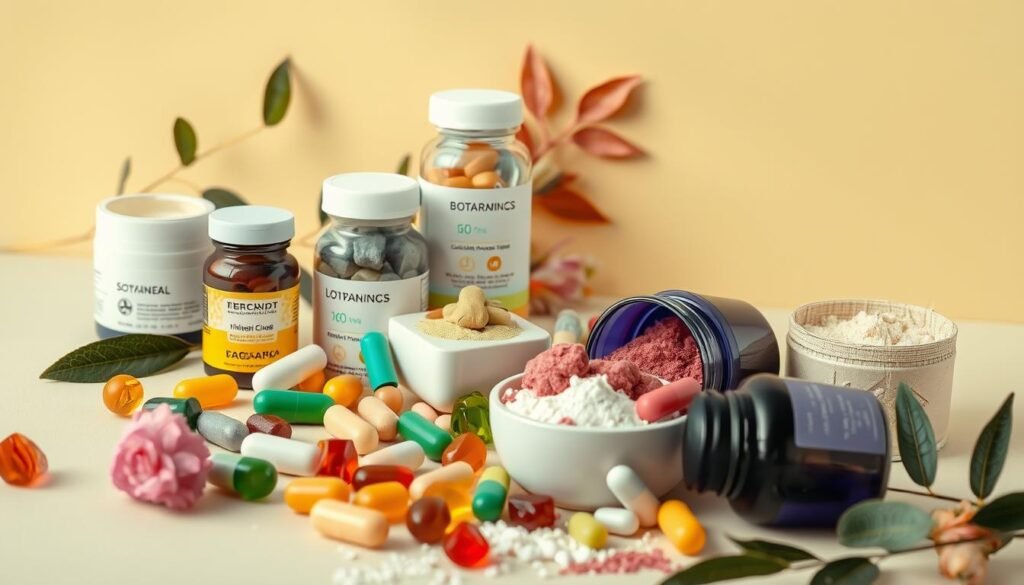Did you know about 44 percent of U.S. adults feel anxious? That’s over 113 million people looking for ways to ease their anxiety.
Vitamins are becoming a popular natural remedy for anxiety. Studies show certain vitamins can greatly lower anxiety symptoms. They play a big role in mental health care.
This article will explain how vitamins help with anxiety and panic attacks. To know which vitamins help, check this resource on vitamins for anxiety and panic.
Key Takeaways
- 44% of U.S. adults experience anxiety symptoms.
- Vitamin D deficiency affects more than one-third of the U.S. population.
- Magnesium plays a vital role in reducing anxiety symptoms.
- Several B vitamins can aid in managing stress and promoting mental clarity.
- Natural remedies for anxiety may provide a safe alternative to pharmaceutical treatments.
Understanding Anxiety and Panic Attacks
Anxiety and panic attacks are big mental health issues in the United States. They include different types of anxiety disorders. Each has its own symptoms and triggers. Knowing about these can help those looking for help.
An Overview of Anxiety Disorders
Anxiety disorders show up in many forms. Some common ones are Generalized Anxiety Disorder (GAD) and Panic Disorder. These disorders make daily life tough. Knowing about them can help people recognize what they’re going through and get the right help.
Common Symptoms of Anxiety
It’s key to know the common symptoms of anxiety. They vary but can include:
- Elevated heart rate
- Shortness of breath
- Excessive worry or fear
- Tightness in the chest
- Difficulty concentrating
Spotting these symptoms means someone might need help and support.
Panic Attack Triggers
What triggers panic attacks differs for everyone. Some triggers are stressful events, certain places, or social settings. Knowing what triggers attacks can help people handle their anxiety better. They can find ways to deal with panic attacks when they start.
| Trigger Type | Description | Possible Response |
|---|---|---|
| Stressful Life Events | Major changes like losing a job or divorce | Develop coping strategies, seek support |
| Environmental Factors | Small spaces or loud sounds | Practice calming techniques ahead |
| Social Situations | Talking in front of people or being in crowded spots | Slowly get used to these places |
Getting to know anxiety disorders, spotting anxiety symptoms, and understanding panic attack triggers helps a lot. This knowledge makes people more resilient. It also helps them manage their experiences better and find the support they need for their mental health.
The Role of Vitamins in Mental Health
Vitamins play a key role in our mental health. They help regulate mood and manage stress. They are vital for making hormones and neurotransmitters, crucial for good mental health.
How Vitamins Affect Mood and Stress Levels
Studies show that not getting enough of certain vitamins can make mood issues worse and increase anxiety. For instance, lacking vitamin B1 (thiamin) can lead to memory problems, anxiety, and quick to anger. Vitamin B12 is crucial for carrying oxygen; without enough, one might feel paranoid or confused. Vitamin D stands out for its role in making serotonin and dopamine. It helps fight stress by ensuring we get enough vitamins.
Importance of Nutritional Balance for Mental Clarity
Keeping a nutritional balance is key for clear thinking. Not getting enough B6, B9 (folate), and zinc can make anxiety worse. Eating the right foods can help keep your mind clear and mood stable. For example, foods high in omega-3 fatty acids, like fatty fish and nuts, support brain chemicals and lessen anxiety. Adjusting your diet is a good way to boost your mental health.
| Vitamin | Role in Mental Health | Sources |
|---|---|---|
| B1 (Thiamin) | Memory and mood regulation | Whole grains, pork, fish |
| B6 | Neurotransmitter synthesis | Poultry, fish, potatoes |
| B9 (Folate) | Linked to depression relief | Leafy greens, legumes, citrus fruits |
| B12 | Mood and cognitive function | Animal products, fortified cereals |
| Vitamin D | Mood regulation, serotonin production | Sunlight, fatty fish, fortified foods |
| Zinc | Supports neurotransmitter function | Meat, shellfish, legumes |
Vitamins for Anxiety and Panic Attacks
Understanding specific vitamins can empower people looking for natural relief from anxiety. Vitamins D, Magnesium, and B Vitamins are important. Each offers benefits for anxiety support. Adding these vitamins to your diet can boost mental health.
Key Vitamins Linked to Reducing Anxiety Symptoms
Some vitamins help ease anxiety and panic attack symptoms. Among them are:
- Vitamin D: Essential for mental health, over a third of Americans lack enough. Studies show 1600 IU of Vitamin D for six months can improve anxiety.
- Magnesium: Known as the “calming mineral,” it aids stress response. Half of Americans get less than the needed 420 mg for men and 320 mg for women. Eating magnesium-rich foods can lessen anxiety.
- B Vitamins: They can boost mood and life quality. B1 (thiamine) and B6 (pyridoxine) are especially good. 250 mg of B1 and moderate B6 help.
How to Incorporate These Vitamins into Your Diet
Adding these vitamins to your diet is doable through food and supplements. Here are tips:
- For Vitamin D: Eat fatty fish, fortified dairy, and get sunlight.
- For Magnesium: Nuts, seeds, whole grains, and leafy greens like spinach are great sources.
- For B Vitamins: Find them in whole grains, eggs, dairy, and legumes. A B complex supplement is also an option.
These strategies can lead to better mental health. Focusing on vitamins for anxiety and panic attacks offers a way to better life quality.
Top Vitamins for Anxiety Relief
Finding the right vitamins can be a game-changer for people dealing with anxiety. They support our brain and nerves, making us feel better overall. Let’s look at some top vitamins that help lessen anxiety.
Vitamin D: A Key Player in Mental Health
Vitamin D has a big role in our mental health. Studies link low Vitamin D levels to higher anxiety. One study showed that taking 1600 IU of Vitamin D reduced anxiety. With Vitamin D deficiency common in the U.S., getting enough might ease anxiety for some.
Having the right amount of Vitamin D keeps our brains working well and our moods steady.
Magnesium: The Calm Mineral
Magnesium is great for calming nerves. It reduces cortisol, the stress hormone, which is high in anxious people. Sadly, up to half of Americans don’t get enough Magnesium. Eating foods high in Magnesium can help with anxiety and panic attacks.
Foods like leafy greens, nuts, and grains are rich in Magnesium. Adding them to your diet can boost your mental health.
B Vitamins: Essential for Stress Management
B Vitamins are key in fighting stress and anxiety. For example, 250 mg of Vitamin B1 each day can help with anxiety. Also, more Vitamin B2 can lower your chance of feeling anxious. And keeping B6 levels up, but not over 100 mg per day, can cut down on stress.
Together, these B Vitamins can make a big difference in managing anxiety and keeping your mind clear.

Natural Supplements for Panic Attacks
Anxiety and panic attacks deeply affect daily life. Many seek natural aids to ease these issues. Various herbal remedies show promise, yet knowing their safety and effect is key.
Popular Herbal Remedies for Anxiety
Some herbal remedies are known for their calming impact. Popular choices include:
- Kava: It’s valued for relaxation but comes with liver health warnings.
- Valerian: Aids in sleep and may lessen anxiety by soothing nerves.
- Lavender: It is often used in aromatherapy to decrease anxiety. Studies suggest it can cut anxiety by up to 30%.
- Passion Flower: Shows potential in managing anxiety and improving mood.
Before trying any supplement for panic attacks, talking to a doctor is wise. They help in picking the safest options. To learn how vitamin deficiencies might affect anxiety, check out this detailed discussion.
Safety Concerns with Herbal Supplements
Although herbal remedies are popular, their safety can’t be ignored. Side effects depend on the person and herb. Examples include:
| Herb | Potential Risks |
|---|---|
| Kava | Potential liver damage with too much use |
| Valerian | Could lead to drowsiness or upset stomach |
| Lavender | Some might experience skin irritation |
| Passion Flower | May cause drowsiness or a faster heart rate |
It’s crucial to understand the safety of herbal supplements and watch how you react to them. Adding these options to a wider plan for managing anxiety is beneficial. Yet, expert advice is essential.
Best Practices for Using Vitamins and Supplements
Taking vitamins and supplements for anxiety can help, but be careful. It’s very important to talk to healthcare experts before starting. They can evaluate your health and give advice that suits you best.
Consulting with a Healthcare Provider
Healthcare professionals can offer great advice on which vitamins and supplements might help with anxiety. They take care of safety concerns, check how these might affect other medicines, and plan the best approach. With their help, you can use vitamins effectively and safely.
Understanding Dosages and Side Effects
Paying attention to how much vitamin you take and its side effects is critical. Supplements can cause side effects that range from mild to moderate. It’s important to keep an eye on how they affect you. For instance, magnesium has shown promise for anxiety, but we need more research to know how much to safely take. Getting advice on dosage can make using vitamins and supplements for anxiety safer and more beneficial.

Behavioral Lifestyle Changes to Combat Anxiety
Changing your behavior to fight anxiety improves mental well-being. Exercise and eating well help physically and emotionally. Making exercise a daily habit is key for anxiety management.
The Importance of Regular Exercise
Exercise and mental health are closely linked. Studies show workouts can cut anxiety in nearly half the people. Running, biking, or fast walking three to five times a week for 30 minutes boosts endorphins. These endorphins lower stress and anxiety, showing how crucial exercise is.
Stress Management Techniques
Adding stress management techniques to exercise helps with anxiety. Mindfulness activities like meditation or yoga can cut anxiety by 30%. They should be done for 10-20 minutes a few times a week. Deep breathing exercises also bring quick calmness in stressful times. These methods create a balanced life, improving your mental health overall.
Research on Vitamins and Anxiety Management
Understanding how vitamins affect anxiety is crucial. Many studies show vitamins might help those feeling anxious. These findings reveal the link between vitamin lack and anxiety, and how vitamins might help.
Recent Studies and Findings
Studies found interesting links between vitamins and anxiety relief. Especially Vitamin D and B vitamins seem useful. A study found that low Vitamin D levels were linked to more anxiety symptoms. This shows nutrition’s role in mental health.
Also, research on kava found it significantly reduces anxiety. This suggests some herbal supplements could also help with anxiety.
Expert Opinions on Vitamin Efficacy
Experts believe in using vitamins to manage anxiety, focusing on Vitamin E. Studies suggest Vitamin E could lower oxidative stress, which is linked to anxiety. Nutrition and mental health experts recommend including vitamins in treatment plans. It’s key for healthcare providers to know about these nutrients as more people turn to alternative medicine.

Combining Vitamins with Other Natural Remedies
Many people looking for help with anxiety find a mix of approaches works best. Adding vitamins to other natural methods can greatly improve mental health. Aromatherapy and mindfulness are two key ways to ease stress. These methods are crucial for managing anxiety well.
Aromatherapy and Essential Oils
Aromatherapy is known for its role in easing anxiety. Essential oils, like Lavender and Bergamot, have a calming effect. They can lessen stress. Research shows they are effective in reducing anxiety symptoms. This makes them great choices for those seeking natural anxiety solutions. Just using these oils in your room or bath can make the space more relaxing.
Mindfulness and Meditation Practices
Mindfulness and meditation can greatly help in coping with anxiety. They help you concentrate on the now, reducing worry. Pairing these exercises with vitamins can boost anxiety relief. Studies show a strong link between mindfulness and lower anxiety. This makes it a key element in a full anxiety care plan.
Discovering natural remedies, like vitamins, along with aromatherapy and mindfulness, offers a strong way to fight anxiety symptoms.
| Natural Remedy | Benefits | Methods of Use |
|---|---|---|
| Aromatherapy (Lavender, Bergamot) | Reduces stress and promotes relaxation | Using essential oil diffusers or adding to baths |
| Mindfulness | Enhances focus on the present and reduces anxiety | Meditation, mindful breathing, or yoga |
Conclusion
In the quest for easing anxiety, vitamins play a key role. It’s been found that vitamin B6, for instance, helps balance our brain chemicals. This not only lowers anxiety but also stress and depression in young adults. So, vitamins, along with minerals and lifestyle changes, offer broad natural support for anxiety.
Those dealing with anxiety or panic attacks can see real benefits from a well-planned approach. A complete treatment plan boosts mental health. Adding essential vitamins to your diet, and getting advice from doctors, is a smart move for managing anxiety.
Adding vitamins to your everyday life, along with healthy habits, is a strong move for fighting anxiety. It improves your overall health. Studies, like the one on vitamin B6’s role in mood improvement and anxiety reduction (details here), bring new hope. They show ways for people to find calm and stability, despite anxiety’s challenges.